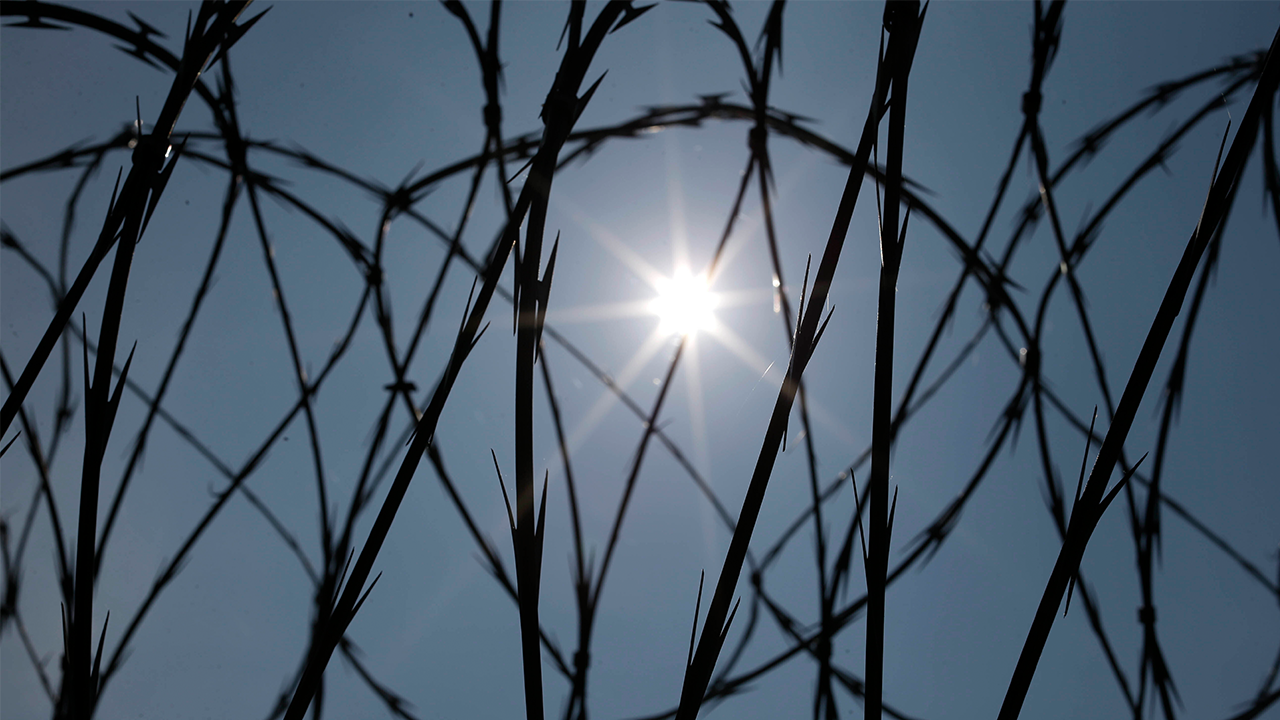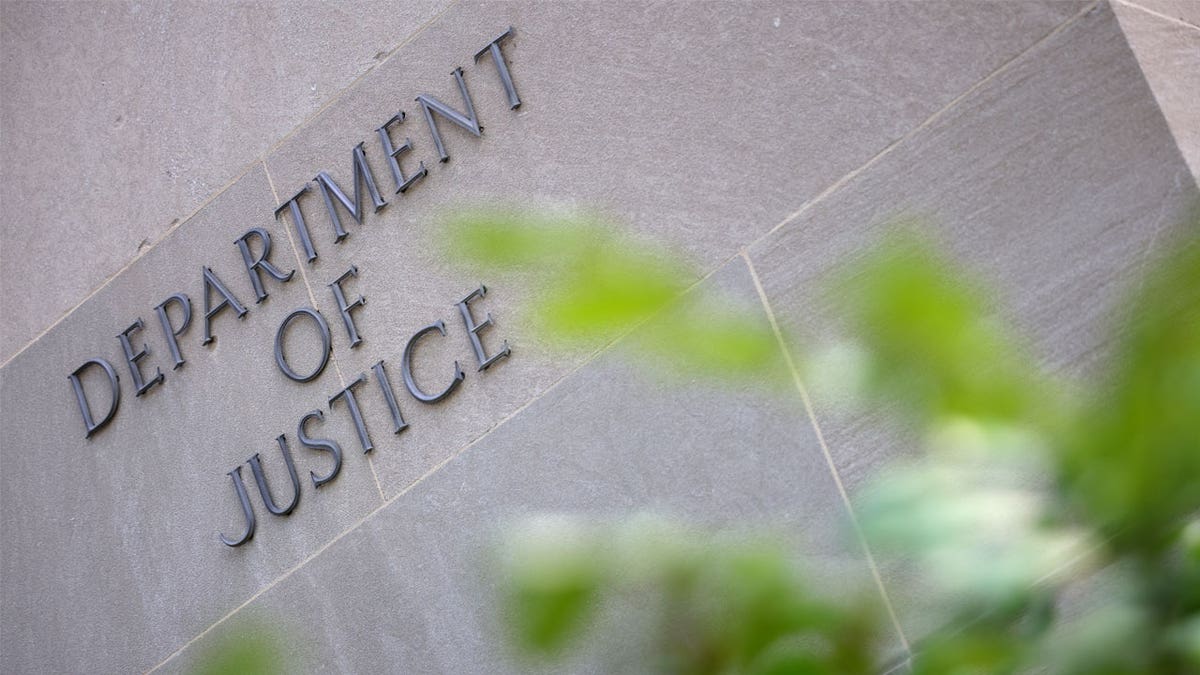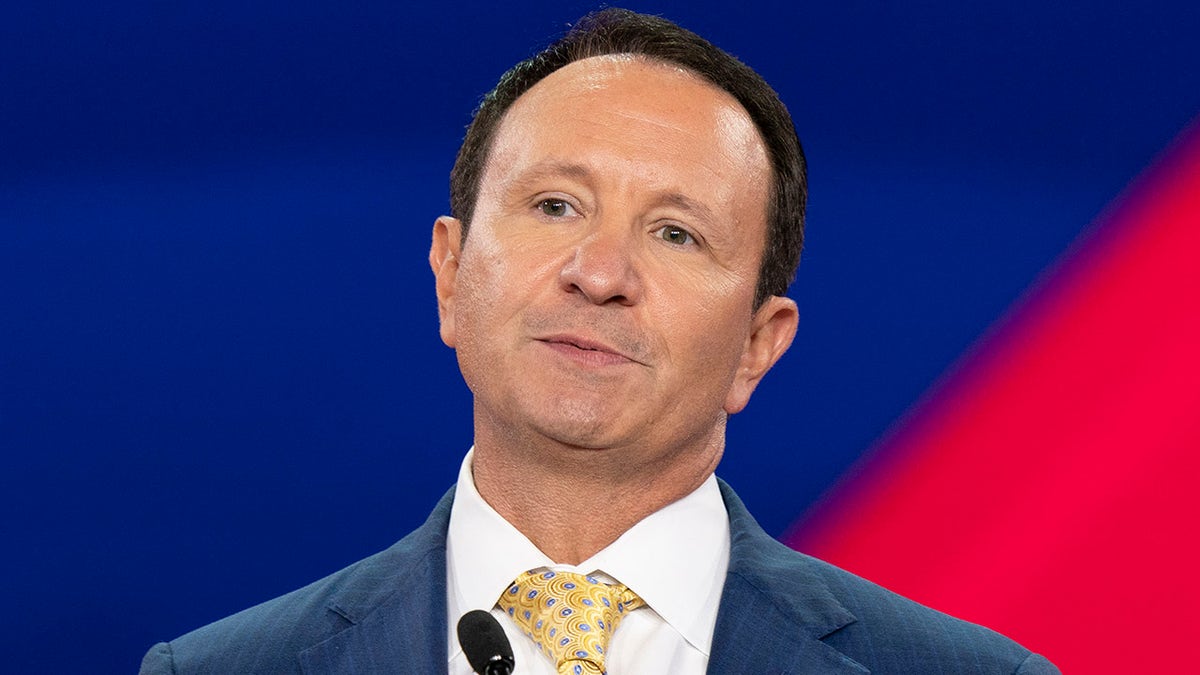Louisiana
Her baby was developing without a skull. She had to leave Louisiana to get an abortion.

The day before Mardi Gras, Brittany and Chris Vidrine got exciting news — Brittany was pregnant. They would be adding a third child to their family.
But when she went in for a 16-week checkup, Brittany Vidrine learned her baby had anencephaly, a fetal abnormality in which a baby’s skull does not form. There is no known cure or treatment. It causes almost all babies to die shortly after birth, according to the Centers for Disease Control.
The Vidrines, who live near Mamou, Louisiana, considered their options and Brittany’s previous pregnancy complications. They decided the safest option was to terminate the pregnancy. But they couldn’t connect with a doctor who would perform the procedure in Louisiana and instead traveled out of state.
“It was a choice we had to make, and I don’t believe we should have had to go through the hoops we had to jump through to make this choice. This wasn’t a choice we made lightly,” Brittany Vidrine said.
“To have to make this choice and then have to go through everything on top of it was just hurt added to the pile of already hurt we were experiencing.”
Even though the Louisiana Department of Health has issued a list of conditions that would be exempt from the state’s abortion ban, including anencephaly, the state’s healthcare providers fear potential lawsuits, fines and jail time that could come from terminating pregnancies, said Michelle Erenberg, the executive director of Lift Louisiana, which advocates for expanded access to abortion and other reproductive rights.
“We’re no longer talking about these laws creating barriers to people who are choosing to terminate a pregnancy early on or for other reasons beyond health concerns,” she said.
“What’s happening now is the law is creating barriers to people who are carrying wanted pregnancies who are having serious complications that are making the pregnancy non-viable or creating significant health risks to the person carrying.”
‘I knew what the outcome would be’
Brittany and Chris Vidrine’s two children, a 6-year-old son and a 3-year-old daughter are joined at the hip. When her son gets home from school, he immediately looks for his sister, who asks, “Did you miss me, bubby?”
“We just wanted one more for them to love and play with. Another sibling,” the 32-year-old mom said.
She started taking pre-natal vitamins and extra folic acid at the recommendation of a nurse practitioner. They were excited when they found out she was pregnant Feb. 20.
Everything seemed normal. There was nothing that stood out, Brittany Vidrine said. She even experienced nausea as much in her first trimester as she had with her previous children.
When it was time for a 16-week check-up with her obstetrician, Vidrine told her husband he didn’t have to come. They didn’t want to know the child’s sex so it would be a routine ultrasound.
“We don’t like to find out the sex of the baby. Just as long as it’s healthy is what matters,” she said. “We found out the sex of my other two when they were born so we were following suit with the third one.”
But during her ultrasound appointment, Vidrine’s doctor told her the baby had anencephaly. The fetal anomaly occurs when the upper part of the neural tube, which affects the formation of the baby’s brain, skull, spinal cord and back bones, does not close all the way, according to the CDC. Its causes are unknown.
About one in every 4,600 babies in the United States is born with anencephaly, including two people Vidrine knows. She knew what came with the diagnosis: that the baby she had so excitedly told her children about would not come home.
“Whenever he said the word, I knew what the outcome would be,” she said. “My thoughts went straight to what’s next.”
Her doctor, who had not delivered her first two children, sent her to a hospital to have her baby’s diagnosis confirmed. He didn’t offer to call her husband and didn’t offer much information about the fetal anomaly, Vidrine said. She still has not heard from that doctor since the May 18 appointment.
At the hospital, the staff confirmed Vidrine’s baby had anencephaly. She was referred to a high-risk pregnancy specialist.
Both of Vidrine’s two children were delivered by cesarean section. Her blood pressure also spiked near the end of her previous pregnancies. And a baby with anencephaly carries an increased medical risk to the pregnant person.
Vidrine could already feel her baby fluttering, the kicks and swooshes. But she couldn’t fathom carrying a baby for 23 more weeks, grieving and knowing that the baby would be stillborn or would die not long after birth.
Because of those factors, especially the risk to Brittany’s health, the Vidrines knew they wanted to terminate the pregnancy.
“Ultimately, there was no other choice for us,” she said. “I have two other kids I need to be here for.”
At the appointment with the high-risk pregnancy doctor, a third ultrasound was performed, the picture of a baby that could never come home appeared on the screen. The doctor confirmed that Vidrine’s child had anencephaly and explained more about the condition.
But when Vidrine told the doctor she wanted to terminate the pregnancy, the doctor initially told her Louisiana law prohibited her from having the procedure, Vidrine said. At Vidrine’s insistence that LDH made an exception for babies with anencephaly, the doctor said she would reach out to the other obstetricians in the state.
“The nurse called me back and told me that she had talked to one doctor and he said he wouldn’t treat anyone who wasn’t his patient and the other two didn’t respond,” Vidrine said. “(The nurse) told me just to go ahead and go out of state.”
Vidrine did her own research, ultimately finding a healthcare provider in Colorado, where she drove to with her family to terminate her pregnancy.
Explaining loss
One of the toughest parts has been explaining to her children that the new sibling they expected to welcome won’t be coming. Even though their mom was going to the doctor, there was nothing that could be done to make it better.
“My son was at the point where he was realizing what was going on and my belly was just starting to kind of poke out and show,” Vidrine said. “He was excited to see pictures of the baby. So when I got home and I didn’t have the pictures to show him, we had to explain to him that the baby’s going to be in heaven and that we won’t get to take the baby home with us.”
Her 3-year-old used to lift Vidrine’s shirt, peering into her belly button, insisting she could see the baby inside.
“After this all happened it was like, we have to try and stop her,” she said. “It becomes painful to explain there’s no baby in there.”
Vidrine was angry that her healthcare providers left her virtually alone to sort out how to terminate her pregnancy. She said she understood that they likely felt their hands were tied but said she doesn’t understand why they couldn’t have done more to support her emotionally.
She wished the Louisiana legislature would make it clear to healthcare providers what they can and cannot do.
Giving healthcare providers more assurances that they wouldn’t be criminally prosecuted for treating their pregnant patients, especially when their health is at risk and creating exceptions for rape and incest is something Lift Louisiana advocated for during the 2023 legislative session, Enrenberg said. But most of those bills failed to exit committee.
“Physicians are terrified that their decision or provision of care to their patients could be second-guessed and they could be criminally prosecuted,” she said. “It’s unconscionable in a state like Louisiana where we already have a serious maternal health crisis that we would be creating any additional threats to pregnant woman’s health, which is what these laws do.”
Anti-abortion groups such as Louisiana Right to Life, which wields influence among the mostly Republican Legislature, oppose the exception for “medically futile” pregnancies altogether.
“We recognize the deep suffering families experience after receiving grave diagnoses. With this being said, all persons, including those with disabilities or terminal illnesses, have the right to life,” Executive Director Benjamin Clapper wrote when LDH was considering conditions that would be exempt from the state’s abortion ban.
Accepting the loss
Brittany and Chris Vidrine believe that now was not the time for them to have another child. They’re hoping to have another baby in the future and are grateful for their two healthy children.
“We accept that we lost the baby,” she said. “It’s been more so what we’ve had to go through that made us angry.”
“We did lose our baby, but we can try again,” she added. “It’s just the heartbreak for the people that have to go through it and can’t financially afford to make the decision that they feel they need to make.”
Vidrine said anyone who is going through the same experience as her can reach out for support.

Louisiana
Seeking Louisiana Young Heroes for 2025

Louisiana
Louisiana prisons routinely hold inmates past their release date, Justice Department argues

Louisiana’s prison system routinely holds inmates for weeks or months after they were supposed to be released from custody following the completion of their sentences, the U.S. Justice Department said in a lawsuit filed Friday.
The lawsuit against the state comes after a multi-year investigation into a pattern of “systemic overdetention” that violates inmates’ rights and costs taxpayers millions of dollars per year.
Since at least 2012, more than a quarter of the inmates scheduled to be released from Louisiana prisons have been held past their release dates, according to the DOJ.
LOUISIANA LAWMAKERS WEIGHING CONSTITUTIONAL AMENDMENT THAT WOULD SEND MORE JUVENILE OFFENDERS TO ADULT JAILS
Louisiana’s prisons often hold inmates long after they were supposed to be released following the completion of their sentences, the DOJ says. (AP)
The Justice Department warned Louisiana officials last year that it may file a lawsuit against the state if it failed to fix the problems. Lawyers for the department argue that the state made “marginal efforts” to address the issues, noting that such attempts at a fix were “inadequate” and showed a “deliberate indifference” to the constitutional rights of inmates.
“[T]he right to individual liberty includes the right to be released from incarceration on time after the term set by the court has ended,” Assistant Attorney General Kristen Clarke said in a statement.
“To incarcerate people indefinitely … not only intrudes on individual liberty, but also erodes public confidence in the fair and just application of our laws,” the statement added.

More than a quarter of the inmates scheduled to be released from Louisiana prisons since at least 2012 have been held past their release dates, the Department of Justice said. (Kevin Dietsch/Getty Images)
Louisiana Gov. Jeff Landry and state Attorney General Liz Murrill, both Republicans, attributed the problem to the “failed criminal justice reforms” pushed by “the past administration.”
“This past year, we have taken significant action to keep Louisianans safe and ensure those who commit the crime, also do the time,” Landry and Murrill said in a joint statement to The Associated Press. “The State of Louisiana is committed to preserving the constitutional rights of Louisiana citizens.”
BIDEN CONSIDERS COMMUTING THE SENTENCES OF FEDERAL DEATH ROW INMATES: REPORT

Louisiana Gov. Jeff Landry speaks at CPAC Texas 2022 conference at Hilton Anatole. (Radin/Pacific Press/LightRocket via Getty Images)
The two state officials also purported that the lawsuit is a last-ditch effort by President Biden, who leaves office next month, arguing that President-elect Trump’s incoming administration would not have pursued the case.
CLICK HERE TO GET THE FOX NEWS APP
Advocates have repeatedly challenged the conditions in Louisiana’s prison system, which includes Angola, the largest maximum-security prison in the nation, where inmates pick vegetables by hand on an 18,000-acre lot. The site was once the Angola Plantations, a slave plantation owned by Isaac Franklin and named after Angola, the country of origin for many of the enslaved people who worked there.
The Associated Press contributed to this report.
Louisiana
Army Black Knights Predicted to Beat Louisiana Tech in Independence Bowl

The Army West Point Black Knights came up short in their last game, as they lost their annual rivalry matchup against the Navy Midshipmen 31-13 to lose the Commander-in-Chief’s Trophy.
But, their season is not yet over, as they will have a chance to finish things on a high note in the Independence Bowl against a new opponent; the Louisiana Tech Bulldogs.
Originally, the Black Knights were supposed to face off against the Marshall Thundering Herd, but a change had to be made after they experienced a mass exodus of players entering the transfer portal following a coaching change.
Based on records, the quality of the opponent would seem to have dropped off considerably. Marshall had 10 victories, while Louisiana Tech had only five.
But, Adam Rittenberg of ESPN still believes that this will be a competitive game in Shreveport, La. in the Bulldogs’ backyard. Louisiana Tech is in Ruston, La., 70 miles away from Shreveport.
He predicted that Army will sneak away with a 23-16 victory.
“he Bulldogs have half the number of wins as the Thundering Herd, but their defense can be very stingy at times, and will need to perform against Bryson Daily and the Black Knights. … Army is undoubtedly still smarting from the Navy loss, and top running back Kanye Udoh entered the portal. Louisiana Tech jumps ahead early behind quarterback Evan Bullock, but Army eventually takes control and grinds out a low-scoring win, its 12th on the season.”
Rittenberg pointed out that several of LA Tech’s defensive linemen have entered the transfer portal. Udoh just announced his transfer to Arizona State.
This has already been one of the best seasons in program history, as they reached the 11-win mark only one other time in 2018. But, an argument can be made this is their best season since it won its last national championship because it was not independent.
The Black Knights were a member of the American Athletic Conference, the first time since 1998-2004 that they weren’t independent as a member of Conference USA. They found a ton of success, going 8-0 in the regular season before defeating the Tulane Green Wave in the AAC Championship Game in West Point, New York.
Army has shown an ability to grind out wins, playing a physical style of football on both sides of the ball. Daily is the leader offensively, producing with his arm and legs at a high level.
He threw for 942 yards with nine touchdowns and only four interceptions, three of which came in the matchup against Navy. On the ground, he led the AAC with 283 carries, 1,532 yards and 29 scores.
His 29 rushing touchdowns were the most in the country, as he won the 2024 AAC Player of the Year Award.
The Black Knights would love to see Daily provide one more memorable performance to help the team reach the 12-win mark for the first time in program history.
-

 Politics1 week ago
Politics1 week agoCanadian premier threatens to cut off energy imports to US if Trump imposes tariff on country
-
/cdn.vox-cdn.com/uploads/chorus_asset/file/25789444/1258459915.jpg)
/cdn.vox-cdn.com/uploads/chorus_asset/file/25789444/1258459915.jpg) Technology1 week ago
Technology1 week agoOpenAI cofounder Ilya Sutskever says the way AI is built is about to change
-

 Politics1 week ago
Politics1 week agoU.S. Supreme Court will decide if oil industry may sue to block California's zero-emissions goal
-
/cdn.vox-cdn.com/uploads/chorus_asset/file/25546252/STK169_Mark_Zuckerburg_CVIRGINIA_D.jpg)
/cdn.vox-cdn.com/uploads/chorus_asset/file/25546252/STK169_Mark_Zuckerburg_CVIRGINIA_D.jpg) Technology1 week ago
Technology1 week agoMeta asks the US government to block OpenAI’s switch to a for-profit
-

 Business1 week ago
Business1 week agoFreddie Freeman's World Series walk-off grand slam baseball sells at auction for $1.56 million
-
/cdn.vox-cdn.com/uploads/chorus_asset/file/23951353/STK043_VRG_Illo_N_Barclay_3_Meta.jpg)
/cdn.vox-cdn.com/uploads/chorus_asset/file/23951353/STK043_VRG_Illo_N_Barclay_3_Meta.jpg) Technology1 week ago
Technology1 week agoMeta’s Instagram boss: who posted something matters more in the AI age
-
News1 week ago
East’s wintry mix could make travel dicey. And yes, that was a tornado in Calif.
-
/cdn.vox-cdn.com/uploads/chorus_asset/file/24924653/236780_Google_AntiTrust_Trial_Custom_Art_CVirginia__0003_1.png)
/cdn.vox-cdn.com/uploads/chorus_asset/file/24924653/236780_Google_AntiTrust_Trial_Custom_Art_CVirginia__0003_1.png) Technology2 days ago
Technology2 days agoGoogle’s counteroffer to the government trying to break it up is unbundling Android apps




















